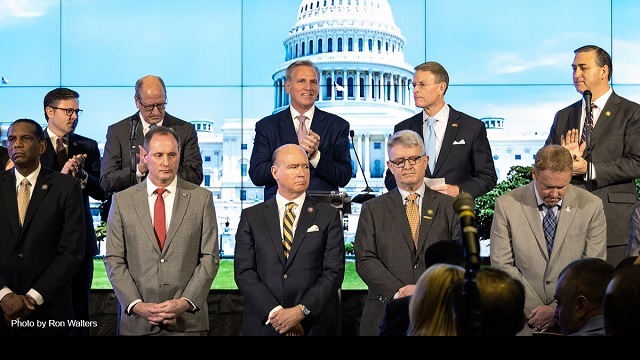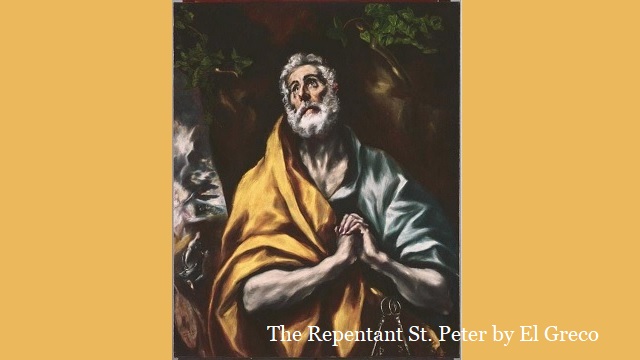Speaker McCarthy, Leaders Gather for Prayer and Repentance

On a snowy Wednesday morning in Washington, D.C., hundreds of people made their way to the Museum of the Bible for a unique event: the National Gathering of Prayer and Repentance. Before dawn had even broken across the city, almost 60 speakers from different nations, organizations, political districts, and backgrounds responded to God’s call to humble themselves and seek His face.
“What you’re about to see,” Family Research Council President Tony Perkins said, “is something you won’t see on MSNBC, CNN, or even Fox — that is, members of Congress who are praying and crying out to God. … Know that God is answering your prayers, America,” Perkins urged, “by raising up leaders who love Him and fear Him.” Led by House Speaker Kevin McCarthy (Calif.) and House Majority Leader Steve Scalise (La.), 16 Republicans from across the country — Mary Miller (Ill.), Brian Babin (Texas), Rick Allen (Ga.), Michael Cloud (Texas), Robert Aderholt (Ala.), Tracey Mann (Kan.), Burgess Owens (Utah), Michelle Steel (Calif.), Gary Palmer (Ala.), Warren Davidson (Ohio), Randy Weber (Texas), Brandon Williams (N.Y.), Diana Harshbarger (Tenn.), Dan Bishop (N.C.), Nathaniel Moran (Texas), and Mike Johnson (La.) — took turns confessing sin and asking for God’s wisdom in the days ahead.
“We have lost our way,” Congresswoman Miller admitted, “because we have rejected you as Creator, Lord, and Savior. Now we are adrift and foolish, calling evil good and good evil. …We most humbly ask you to intervene, deliver us here in Congress and in our country from going our own way and thinking our own thoughts. Please, Heavenly Father, take the scales off our eyes. Help us to acknowledge our need of You. Our need to weep and mourn over our pride, our immorality, child abuse, and idolatry. Draw us back to you and to your word.”
Rep. Bishop asked forgiveness for a nation that has failed to understand “our dependence on You — for imagining that our blessings have come by virtue of our merit, our entitlement, our intellect, our effort.” We repent, he continued, “for acquiescing in the status quo. Forgive us for our lack of courage, our resignation, our cynicism, our hopelessness, our narrow self-interest, and ambition. Forgive us for making our government an idol and then for turning a blind eye as its instrumentalities have accumulated power and turned it against the humanity, the dignity, and the rights with which you have endowed the people. You ask who will go for me and whom will I send? Lord, send me. Forgive us, Jesus, King of all nations.”
After Leader Scalise read Psalm 33, Speaker McCarthy turned to the audience and said he was also asked to share a Scripture, but decided he’d like to “pray and read, if that’d be all right.” He started by thanking God that “we can still honor Your word, study Your word, and teach the next generation.” He asked for the Lord’s blessing on the leaders of Congress who joined him on stage and those who weren’t there today. “I want you to open their hearts. I want you to help them be bold.”
Then, knowing the difficult debates facing both parties, the speaker prayed for the president. “Father, you know I will meet with him today. Father, I ask that you open both of our hearts … that our meeting [would seek] your truth and help for this nation. … [W]e continue to seek your guidance. We ask that you give us the patience of Job. We ask that you give us the intellect, the leadership that you gave David.”
Perkins, who co-hosted the event along with Pastor Jim Garlow, also welcomed Anne Graham Lotz, Ambassador Sam Brownback, Rabbi Jonathan Cahn, former congresswoman Michele Bachmann, Pastor Carter Conlon, and 19-year-old Jacob Kersey, who recently resigned from his Georgia police department when he came under fire for posting a Bible verse about marriage.
Kersey pointed out how much we take for granted the privilege of coming before God in prayer. He lifted up the 800,000 “brave men and women serving in law enforcement,” many of whom are “excellent examples of strength, fortitude, character, and integrity.” “But Father,” he admitted, “we have problems too. We’re sinful human beings. And the events in Memphis and Minneapolis shed light on our brokenness and sin. … We need the Prince of Peace, Jesus. We need you.”
Too many believers, Brunson said — “many teachers of the church” — “have become ashamed of the clear teachings of Jesus Christ. Many care too much about maintaining respectability and social standing and … are not willing to stand against the mainstream of our society, to go against the current. There are all kinds of ways to rationalize compromise. We need to repent and love the truth.”
Luke wrote that “there would be times of distress with perplexities,” Bachmann explained, “meaning that the days would become so difficult that the problems would be humanly impossible to solve. That is our day,” she insisted. “And so it is altogether fitting and proper that we come to our Father with prayers and repentance. It is the only way. It is the best way. It is the right way. It is the healing way. It is the life giving way.”
To watch the National Gathering for Prayer and Repentance, click here.
AUTHOR
TWS Staff Report
EDITORS NOTE: This Washington Stand column is republished with permission. ©All rights reserved. The Washington Stand is Family Research Council’s outlet for news and commentary from a biblical worldview. The Washington Stand is based in Washington, D.C. and is published by FRC, whose mission is to advance faith, family, and freedom in public policy and the culture from a biblical worldview. We invite you to stand with us by partnering with FRC.


